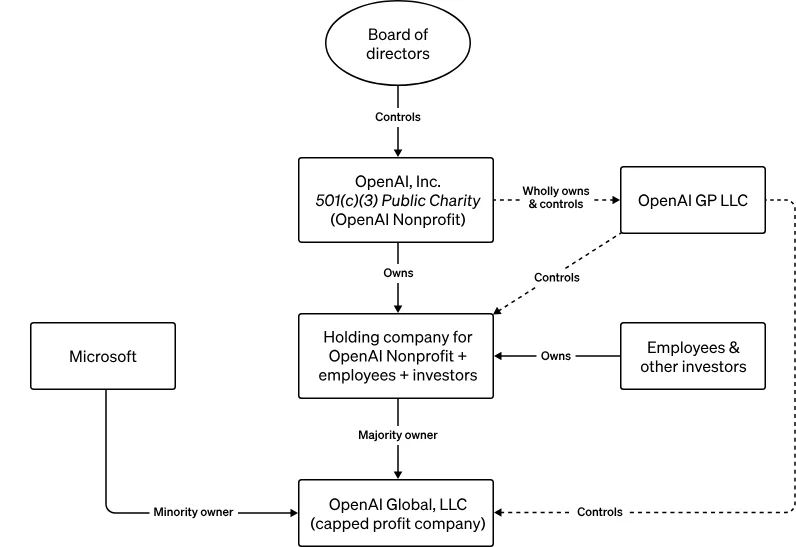OpenAI Governance: Microsoft Still Does Not Have a Seat on OpenAI Board Despite Massive Investment

Microsoft is OpenAI largest backer, but why doesn't have a seat in the board? | Credit: Shutterstock
- OpenAI fired the co-founder and CEO, Sam Altman, who found a new job at Microsoft.
- The choice surprised Microsoft, which knew nothing as it’s not present in the OpenAI board.
- Will it request a seat now, considering it’s the largest backer of the AI company?
OpenAI, the non-profit research company dedicated to ensuring that artificial general intelligence benefits all of humanity, has received significant financial backing from Microsoft. Despite this huge investment, Microsoft does not have a seat on OpenAI’s board of directors.
This decision raises questions about the governance of OpenAI and the potential influence that large technology companies may have on the development of AI. These questions arose in particular after the decision of the OpenAI board to fire the CEO and co-founder, Sam Altman, causing turmoil in the company.
Why Is Microsoft Absent From OpenAI Board?
Microsoft’s lack of a seat on OpenAI’s board despite its massive investment is likely due to a combination of factors. As the company never clarified this aspect, one possibility is that Microsoft wanted to avoid any appearance of conflict of interest, given that it is a major competitor in the artificial intelligence space.
Additionally, Microsoft may have been concerned about ceding too much control over OpenAI’s direction, given the potential for this to impact its own AI efforts negatively.
Another possibility is that OpenAI’s founders wanted to maintain the company’s independence and avoid being seen as beholden to any one investor. This is consistent with OpenAI’s stated mission of ensuring that artificial general intelligence benefits all of humanity, rather than just a select few.

It is also possible that the terms of Microsoft’s investment in OpenAI did not include a board seat. This is not uncommon in venture capital deals, where investors often trade equity for influence but do not necessarily demand a seat on the company’s board.
Regardless of the specific reasons, Microsoft’s lack of a seat on OpenAI’s board is a significant departure from the norm for large technology companies that invest in AI startups. This indicates that OpenAI is actively securing its independence and staying committed to its mission of advancing AI for the benefit of all.
Will Microsoft Request A Seat Now?
But all hypotheses surrounding Microsoft’s absence from the OpenAI board might soon become obsolete. In fact, reports from The Information and Reuters suggest that Microsoft is contemplating requesting a seat on the board or acting as a non-voting board observer for ChatGPT’s controlling company.
Sources close to the company founded by Bill Gates indicate that Microsoft’s potential involvement could provide early insights into board decisions. While it might have minimal impact on Microsoft, serving as a way to stay informed, it holds more significance for OpenAI.
As the primary shareholder, in fact, Microsoft’s involvement could potentially influence its investment strategy, especially after expressing dissatisfaction with being uninformed about Sam Altman’s dismissal through the media.
“Never Again In A Surprising Situation”
Also Brockman Leaves
Following the news, the other co-founder of OpenAI, Greg Brockman, decided to turn his back on the company he helped to found. He’ll also join Microsoft alongside Altman.
Another top manager in OpenAI, the Chief Technical Officer, Mira Murati, may soon leave and follow Altman and Brockman, as reported after a cryptic post on X by the new interim CEO.
Whatever the future of OpenAI, which has named a new CEO, Microsoft has two main decisions to make: continue to invest in the company, requesting a seat on the board of directors, or compete with OpenAI, pressing on its own AI project, after hiring Altman and Brockman.
There would be the third option, to leave everything as it is. However, the turbulent effects of the OpenAI board’s decision to remove the CEO suggest that this hypothesis will not have any consideration by the software giant.
Everything Back To Normal – Or Almost
On Tuesday, November 21, OpenAI announced the return of its co-founder, Sam Altman, as CEO, just days after his dismissal by the board. The agreement outlines a new initial board featuring Bret Taylor as Chair, along with Larry Summers and Adam D’Angelo.
Altman, initially fired and subsequently hired by Microsoft’s CEO, Satya Nadella, for a new AI research team, revealed that he had Nadella’s support for his reinstatement as OpenAI’s CEO. Expressing anticipation for the future and acknowledging the backing of the new board and Satya’s support, Altman stated his commitment to building on OpenAI‘s strong partnership with Microsoft.
Following Altman’s dismissal, a significant number of OpenAI staff had threatened to resign. In a released letter, the majority of the 770-strong staff showed their intention to follow Altman unless the board responsible for his departure resigned.
Notably, co-founder Ilya Sutskever, OpenAI’s chief scientist and a board member involved in Altman’s removal, expressed regret and stated he never intended harm to OpenAI.
Problems Arise In The UK
While the chaos ended in the US, new problems for both OpenAI and Microsoft emerged in the UK on Friday, December 8.